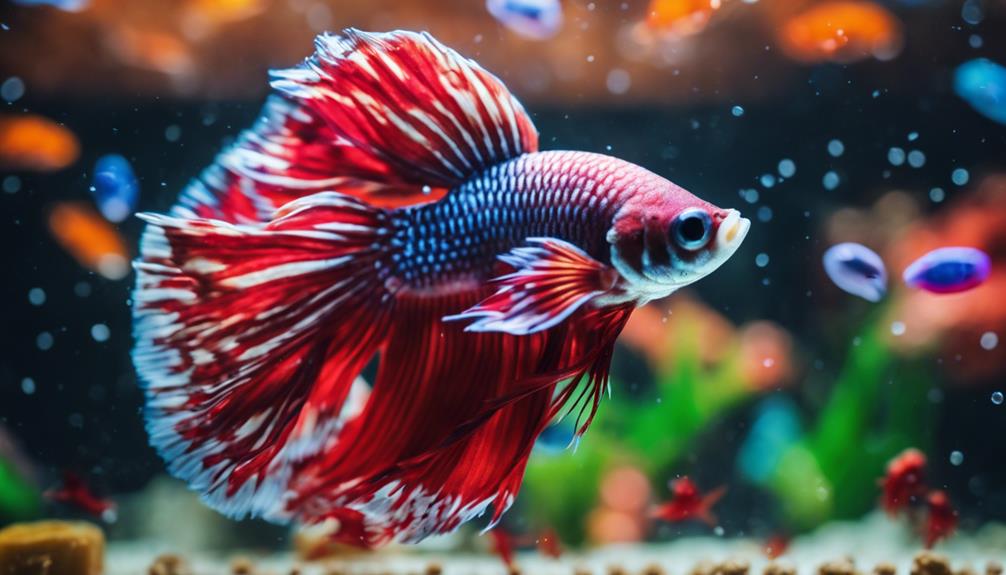Achieving a Balanced Diet for Betta Fish

Ensuring your betta fish have a well-rounded diet is essential for their overall health and vitality. However, simply tossing in some fish flakes won't cut it.
To truly meet the nutritional needs of your vibrant bettas, you must consider a variety of factors. From the types of food you offer to how often and how much you feed them, every detail plays a role in their well-being.
But that's just the beginning of the journey to achieving a balanced diet for your betta companions.
Nutritional Needs of Betta Fish
To guarantee the best health and vibrant colors of your Betta fish, it's important to understand their specific nutritional needs. Betta fish require a diet rich in protein sources to thrive. High-quality protein from sources such as brine shrimp, bloodworms, daphnia, and insects is essential for their growth and overall well-being. These protein sources mimic what Betta fish would naturally consume in the wild, making sure they receive a well-rounded diet.
In addition to protein, color enhancing supplements play an important role in maintaining the vibrant hues of Betta fish. Supplements containing astaxanthin and beta-carotene can intensify the reds, blues, and other colors present in your Betta fish. These supplements act as enhancers, bringing out the full spectrum of colors that Betta fish are known for. When selecting color-enhancing supplements, make sure they're specifically formulated for Betta fish to avoid any potential adverse effects.
Types of Food for Bettas
What're the essential types of food that are recommended for Betta fish to guarantee their peak health and vibrant colors? Understanding the feeding preferences of Betta fish is important in providing them with a balanced diet. Bettas are carnivorous fish that thrive on a diet rich in protein. Offering a variety of foods is key to meeting their dietary needs.
Pellets are a convenient option that often contain a blend of proteins, vitamins, and minerals essential for Betta health. However, live foods such as brine shrimp, bloodworms, or daphnia can mimic their natural diet more closely, promoting vibrant colors and overall wellbeing.
It's important to strike a balance between pellets and live foods to make sure your Betta receives the necessary nutrients. While pellets can be a staple in their diet, incorporating live foods provides dietary enrichment. Observing your Betta's response to different foods can help determine their preferences and tailor their diet for best health. Remember, a diverse diet contributes to a happy and healthy Betta fish.
Feeding Frequency and Portions
For best health and well-being of Betta fish, ensuring the correct feeding frequency and portion sizes is essential. Betta fish are known for their feeding habits, often displaying enthusiasm during meal times. It's recommended to feed your Betta fish small meals 2-3 times a day rather than one large meal. This feeding frequency helps mimic their natural eating patterns and prevents overeating, which can lead to obesity and health issues.
When considering portion control, it's important to provide an amount of food that your Betta can consume within 2-3 minutes. Overfeeding can result in uneaten food sinking to the bottom of the tank, causing water quality problems. A good rule of thumb is to offer an amount of food that's about the size of your Betta fish's eye.
Supplementing Betta Fish Diet
Supplementing your Betta fish's diet with additional nutrients and variety can contribute to their overall health and energy. To guarantee your Betta fish receives a well-rounded diet, consider incorporating dietary supplements in addition to their regular feeding schedule. Here are some important points to keep in mind when supplementing your Betta fish's diet:
- Dietary supplements: Betta fish can benefit from supplements such as vitamins, minerals, and probiotics to support their immune system and overall health.
- Feeding schedule: Introduce variety by offering a mix of live or frozen foods like bloodworms, brine shrimp, and daphnia alongside high-quality pellets or flakes to meet their nutritional needs.
- Avoid overfeeding: While supplements can be beneficial, it's essential to stick to a balanced feeding schedule to prevent overfeeding and maintain water quality.
- Consult a vet: If you're unsure about which dietary supplements to use or how to adjust your Betta fish's feeding schedule, consult a veterinarian with experience in fish care for guidance.
Monitoring Betta Fish Health
To guarantee the well-being of your Betta fish, regular monitoring of their health is essential for detecting any potential issues early on. Start by maintaining ideal water quality in the tank through regular water changes and testing. Clean water is important for preventing diseases and ensuring your Betta's overall health.
Additionally, proper tank setup is crucial; make sure the temperature and pH levels are suitable for your fish. Observing your Betta's behavior is another key aspect of monitoring their health. Pay attention to any changes in swimming patterns, appetite, or unusual behaviors as these can be early indicators of health issues.
Look out for signs of stress such as fin clamping or loss of color. By staying vigilant and proactive in monitoring your Betta fish's health, you can prevent potential problems and guarantee a thriving and happy aquatic companion.
Conclusion
In summary, achieving a balanced diet for betta fish is vital for their overall health and well-being. By understanding their nutritional needs, providing a variety of foods, feeding them the right portions at the right frequency, and supplementing their diet when necessary, you can help make sure that your betta fish remains healthy and thriving.
Monitoring their health regularly will also help catch any issues early on and make adjustments to their diet as needed. Remember, a well-fed betta is a happy betta.
